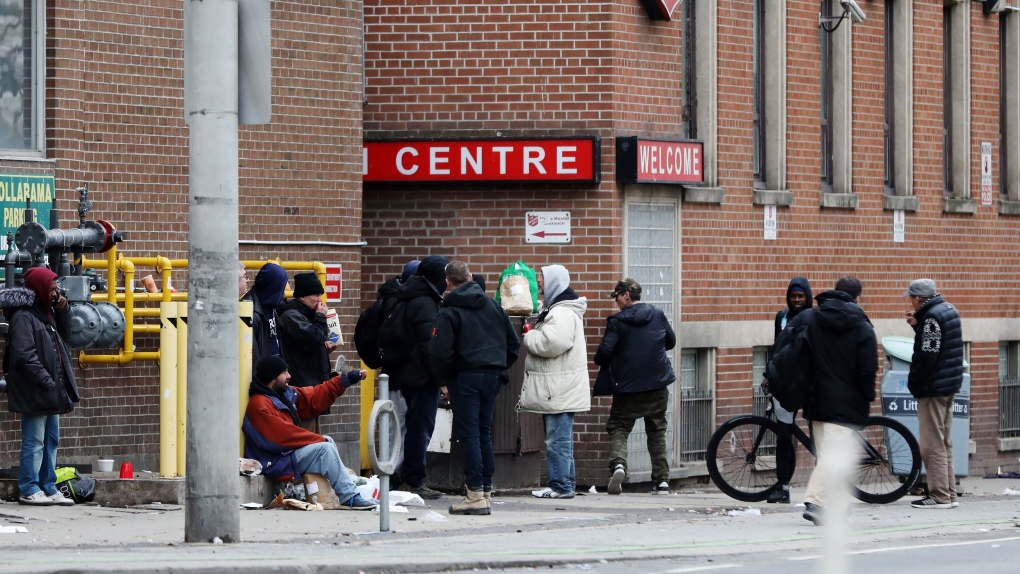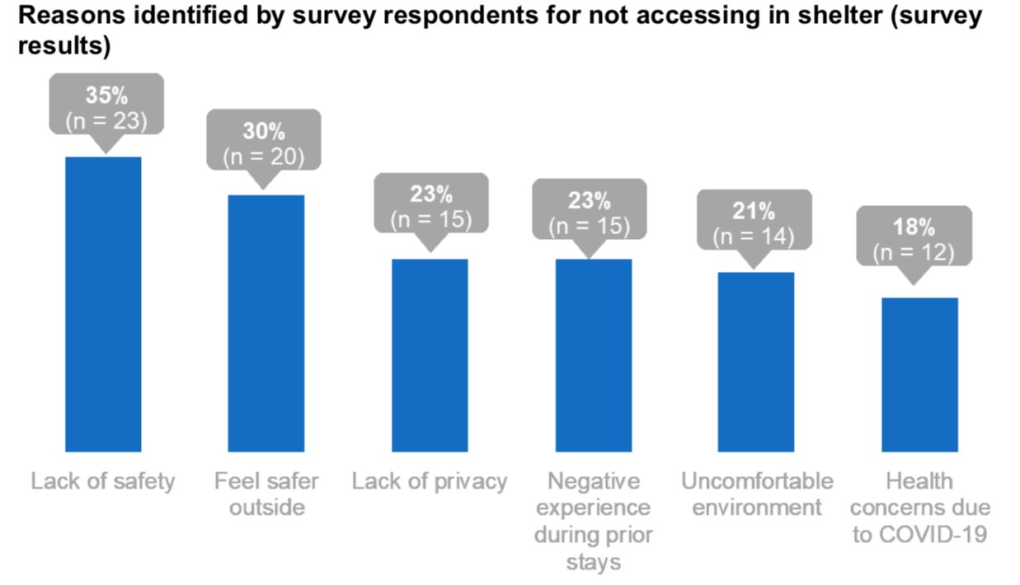'Like a rat cage': Toronto’s homeless describe packed shelters, surge in violence and death
 FILE- People gather outside of a shelter in downtown Toronto on Saturday, March 28, 2020. THE CANADIAN PRESS/Colin Perkel
FILE- People gather outside of a shelter in downtown Toronto on Saturday, March 28, 2020. THE CANADIAN PRESS/Colin Perkel
New data on Toronto’s city-run shelters reveal that the system has seen an explosive surge in violence in the last few years.
The data, obtained by The Canadian Press, discloses that, on average, violent incidents in shelters have increased more than 200 per cent in the last five years — from 120 incidents per month in 2016 to 368 per month in January of 2021.
It isn’t only violent incidents that have increased, either.
According to data provided by the City of Toronto, deaths in city-run shelters have increased by 125 per cent in the first quarter of 2021, compared to that of 2020. There were 16 deaths in the city-run shelter system from January to April of 2020. In that same time period in 2021, 36 deaths were reported.
Users of the city-run shelter systems say they have noticed the increase in tensions and violence. Many cite the COVID-19 pandemic, coupled with overcrowding and the overdose crisis, as the reasoning behind the increase.
Michael Eschbach, a resident of the city-run shelter system for almost nine years now, said overcrowding has been a big part of why he thinks tensions are rising in shelters. He is now staying in a city-run hotel-turned-shelter in Parkdale, while awaiting permanent housing, but previously used congregate setting shelters.
“The city kept stuffing more and more beds into the basement of this church, so it became so overcrowded, like a rat cage, and then all sudden you could see people snipping and getting testy with each other,” Eschbach told CTV News Toronto.
As of June 14, city data revealed that a total of 4,790 residents are using city-run shelters, yet lists the total occupancy as 3,225 for that day.
Eschbach says there’s nowhere to go to “calm down” in the congregate setting shelters.
“Once there's tension between two people, it almost always literally explodes into some sort of violent confrontation. You can't detach yourself from a situation and think it out or calm yourself down,” he continued.
He said he has had to fend off random attacks more than once.
“I had a couple of guys try to beat me up once for no reason at all. You're just sitting there eating dinner and all of a sudden you're on the floor because some guys walk beside you and decide to have a fight right there,” Eschbach said.
Gru, who chose not to include his surname, used the city-run shelter system prior to the pandemic, telling CTV News Toronto he’s not at all surprised to see the increase of violent incidents and death.
“Witnessing violence in the shelters before COVID-19— I could take a pretty educated guess at how things would progress as the fear of COVID spread through the homeless population, and then as COVID-19 itself ripped through the shelters,” Gru said.
“My pre-pandemic shelter experiences always put me in [the same mindset] of the institutional settings that I saw while incarcerated as a younger man … From theft to fights, dorm settings with large numbers of traumatized people are going to manifest in similar ways,” he continued.
When reached for comment, the City of Toronto said “they take safety in the shelter system seriously and have put many measures in place and continues to enhance these measures.”
“The City has engaged an external [infection prevention and control (IPAC)] consultant and representatives are visiting sites in the shelter system, providing additional guidance, and facilitating in-person training and education including on-site environmental services staff,” City spokesperson Kris Scheuer said.
“Each shelter has identified an IPAC lead to coordinate IPAC work and to focus on continuous improvements as needed,” said Scheuer.
On June 10, the city also launched a new toolkit, aimed at preventing overdoses in the houseless population.
Doug Johnson Hatlem, a street pastor at Sanctuary Toronto, told CTV News Toronto that some of the street communities he interacts with on daily basis prefer to stay out of the shelter system due to the violence, death, and overcrowding in city-run shelters and prefer instead to live in encampments — the same encampments that the City of Toronto has been actively working to empty in order to get people into shelters.
The city cites safety concerns in its effort to empty the encampments.
“The health outcomes for people who stay outside are complex and serious. Individuals living in encampments are also at risk of contracting COVID-19. There have been 100 fires in encampments so far this year,” Scheuer said.
But some think the safety concerns in shelters outweigh the safety concerns surrounding outdoor living.
During a report on shelter safety seen by Toronto City Council on June 8, a graph revealed that the two top reasons people chose not to use the city-run shelter system were due to concerns surrounding safety.
 Slides from the June 8 report on Shelter Safety, brought to Toronto City Council. (City of Toronto)
Slides from the June 8 report on Shelter Safety, brought to Toronto City Council. (City of Toronto)
“I think there's a number of reasons, it’s not only the overcrowding, that continues to get worse and worse month over month year over year. I think people don’t often feel that they're treated humanely in [city-run shelters], and the overdose crisis, I think contributes to it as well,” Hatlem said.
A report released in May 2021 by Ontario Drug Policy Research Network at Toronto's St. Michael's Hospital found that the number of houseless residents who died of opioid overdoses more than doubled during the pandemic — from 135 deaths to 323 deaths in the same period the year before.
Zoe Dodd, of the Toronto Overdose Prevention Society, told CTV News Toronto what she thought the city could do to improve safety in shelters and prevent future overdoses.
“Peer witnessing. Making connections with the people,” Dodd said.
“We need to be coming in to talk to them directly about what their needs are, a wellness check to make sure they're okay, putting naloxone everywhere, having everybody who works there trained in person, not just online,” she continued.
As far as the issue of overcrowding goes, Eschbach said the city-run hotel shelters are a good start.
“It’s less, less crowding right off the bat. These hotel shelters work really well. There's violence here, but it's not as bad as an actual shelter. That's because of the separation. Everybody gets their own space to go,” Eschbach said.
Hatlem added that forming a resident council, made up of houseless residents, could help provide power and autonomy to those living on the streets.
“The thing would be to form a residents’ council that would have real power and a real say over how a shelter is run, or how a shelter hotel is run so that they can say ‘These are the things that would make us feel safe.’”
CTVNews.ca Top Stories

'She will not be missed': Trump on Freeland's departure from cabinet
As Canadians watched a day of considerable political turmoil for Prime Minister Justin Trudeau and his government given the sudden departure of Chrystia Freeland on Monday, it appears that U.S. president-elect Donald Trump was also watching it unfold.
BREAKING Canadian government to make border security announcement today: sources
The federal government will make an announcement on new border security measures after question today, CTV News has learned.
Canada's inflation rate down a tick to 1.9% in November
Inflation edged down slightly to 1.9 per cent in November as price growth continued to stabilize in Canada.
The Canada Post strike is over, but it will take time to get back to normal, says spokesperson
Canada Post workers are back on the job after a gruelling four-week strike that halted deliveries across the county, but it could take time before operations are back to normal.
Transit riders work together to rescue scared cat from underneath TTC streetcar
A group of TTC riders banded together to rescue a woman's cat from underneath a streetcar in downtown Toronto, saving one of its nine lives.
Trudeau considering his options as leader after Freeland quits cabinet, sources say
Chrystia Freeland, Canada's finance minister, said in an explosive letter published Monday morning that she will quit cabinet. Here's what happened on Monday, Dec. 16.
Teacher and a teenage student killed in a shooting at a Christian school in Wisconsin
A 15-year-old student killed a teacher and another teenager with a handgun Monday at a Christian school in Wisconsin, terrifying classmates including a second grader who made the 911 call that sent dozens of police officers rushing to the small school just a week before its Christmas break.
A bomb killed a Russian general in Moscow. A Ukrainian official says secret service was behind it
A senior Russian general was killed Tuesday by a bomb hidden in a scooter outside his apartment building in Moscow, a day after Ukraine’s security service leveled criminal charges against him. A Ukrainian official said the service carried out the attack.
Tom Cruise gets a top U.S navy honour for boosting the military with his screen roles
Tom Cruise was awarded the U.S. navy's top civilian honour on Tuesday for 'outstanding contributions to the Navy and the Marine Corps' with 'Top Gun' and other films.































